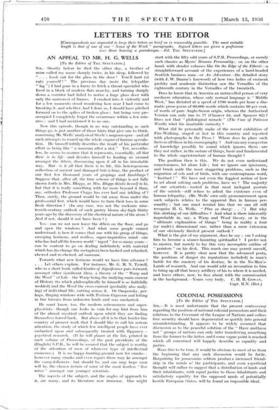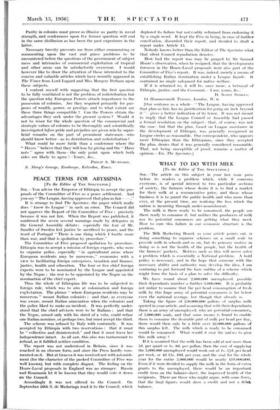COLONIAL POSSESSIONS
[To the Editor of THE SPECTATOR.] Sin,—It is most unfortunate that the present controversy regarding the position of national colonial possessions and their relations to the Covenant of the League of Nations and collec- tive security should have degenerated so quickly into general misunderstanding. It appears to be widely assumed that discussion as to the peaceful solution of the " Have and have not " groups of nations can only infer transferring something from the former to the latter, until some vague point is reached which all concerned will happily describe as equality and justice.
Were this to be true, it would be obvious to most of us from the beginning that any such discussion would be futile. Bargaining for possessions seldom product s increased friend- ship in the minds or the participants, and even siperficial thought will suffice to suggest that a distribution of lands and their inhabitants, with equal justice to those inhabitants and satisfactory equality for the supposed needs of potentially hostile European States, will be found an impossible ideal.
• Parity in colonies must prove as illusive as parity in naval strength, and conferences upon the former question will end in the same disillusion as has been the past experience in the latter.
. Necessary brevity prevents me from either enumerating or commenting upon the vast and grave problems to be encountered before the questions of the government of subject races and intricacies of commercial exploitation of tropical and other areas can be satisfactorily overcome. I would however like to draw the attention of those interested to the concise and valuable articles which have recently appeared in The Times from Lord Lugard and Miss Margery Perham upon these subjects.
I content myself with suggesting that the first question to be fully ventilated is not the problem of redistribution but the question why European Powers attach importance to the possession of colonies. Are they required primarily for pur- poses of wealth, power, or prestige, and to what extent are these three things compatible ? Can the Powers obtain the advantages they seek under the present system ? Would it not be wiser for the whole question of the commercial and strategic values of colonies to be thoroughly and scientifically investigated before pride and prejudice are given rein by super- ficial remarks on the part of prominent statesmen—who should know better—as to distribution and redistribution ?
What could be more futile than a conference where the " Haves " believe that they will lose by giving and the " Have nots " agree with them—the only point upon which both sides are likely to agree !—Yours, &c.,
PHILIP S. Mr1111,0111).
S. Mary's Grange, Easthorpe, Kelvedon, Essex.















































 Previous page
Previous page